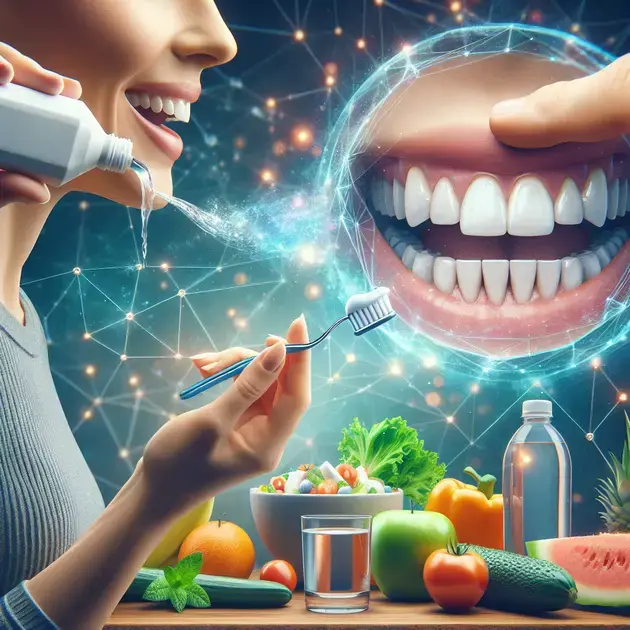Dealing with bad breath can be a frustrating and embarrassing experience for many individuals. Whether it’s caused by poor oral hygiene, certain foods, or underlying health issues, bad breath, also known as halitosis, can negatively impact one’s confidence and social interactions.
Fortunately, there are various ways to combat bad breath and improve oral hygiene. From regular brushing and flossing to using mouthwash and staying hydrated, incorporating simple habits into your daily routine can help address the root cause of bad breath and keep it at bay.

Identifying the Root Cause of Bad Breath
Bad breath, also known as halitosis, can be an embarrassing and concerning issue for many individuals. To effectively combat bad breath, it’s crucial to first identify the root cause of the problem. Common causes of bad breath include poor oral hygiene, certain foods, dry mouth, and underlying health conditions.
One way to pinpoint the cause of bad breath is to visit a dentist for a comprehensive oral examination. A dentist can assess your overall oral health, check for signs of gum disease or tooth decay, and recommend appropriate treatment options. Additionally, keeping a food diary can help you identify specific foods or beverages that may be contributing to your bad breath.
Using a specialized bad breath detection device, such as the Halimeter, can also aid in identifying the specific compounds causing your bad breath. The Halimeter measures the levels of volatile sulfur compounds in your breath, providing valuable insights into the underlying cause of halitosis.
Furthermore, practicing good oral hygiene habits, such as brushing twice a day, flossing daily, and using an antimicrobial mouthwash, can help eliminate bacteria that contribute to bad breath. Regular dental cleanings and check-ups are essential for maintaining optimal oral health and preventing bad breath.
By taking proactive steps to identify the root cause of your bad breath, you can effectively address the issue and enjoy long-lasting fresh breath and improved confidence.
Effective Oral Hygiene Habits for Combatting Halitosis
Maintaining good oral hygiene is essential for combating halitosis and promoting overall oral health. To effectively combat bad breath, it’s important to establish a consistent oral care routine that targets the root causes of halitosis. Here are some effective oral hygiene habits to help you combat bad breath:
1. Brushing:
Brush your teeth twice a day using a fluoride toothpaste and a soft-bristled toothbrush. Brushing helps remove food particles, plaque, and bacteria that can cause bad breath.
2. Flossing:
Don’t forget to floss daily to clean between your teeth and along the gum line where your toothbrush may not reach. Flossing helps remove plaque and debris that brushing alone can’t reach.
3. Tongue Cleaning:
Use a tongue scraper or your toothbrush to gently clean your tongue. Bacteria can accumulate on the surface of your tongue, contributing to bad breath.
4. Stay Hydrated:
Drink plenty of water throughout the day to keep your mouth moist and prevent dry mouth, which can lead to bad breath. Hydration also helps flush away food particles and bacteria.
5. Regular Dental Visits:
Visit your dentist regularly for professional cleanings and check-ups. Your dentist can identify and treat any oral health issues that may be causing bad breath.
Lifestyle Changes to Prevent and Manage Bad Breath
Beyond maintaining good oral hygiene habits, certain lifestyle changes can help prevent and manage bad breath effectively. Making simple adjustments to your daily routine and habits can have a significant impact on your breath freshness. Here are some lifestyle changes to consider:
1. Healthy Diet:
Eat a balanced diet rich in fruits and vegetables and limit your intake of sugary and acidic foods. Certain foods can contribute to bad breath, so choosing nutritious options can help keep your breath fresh.
2. Quit Smoking:
Smoking not only affects your overall health but also contributes to bad breath. Consider quitting smoking to improve your breath freshness and reduce the risk of oral health issues.
3. Stress Management:
Stress can impact your oral health and contribute to bad breath. Practice stress-reducing activities such as yoga, meditation, or deep breathing exercises to improve your overall well-being and breath quality.
4. Proper Sleep Hygiene:
Ensure you get an adequate amount of sleep each night to support your overall health and prevent dry mouth, which can lead to bad breath. Establish a bedtime routine and create a comfortable sleep environment for quality rest.
5. Stay Active:
Engage in regular physical activity to promote saliva flow, which helps wash away bacteria and food particles in your mouth. Exercise also contributes to overall well-being, which can reflect in your breath freshness.

**Maintaining Fresh Breath through Proper Hydration**
Maintaining fresh breath is essential for overall oral health and confidence. One often overlooked aspect of fresh breath is proper hydration. Staying hydrated helps keep saliva production at an optimal level, which is crucial for washing away food particles and bacteria that can cause bad breath. In addition to drinking an adequate amount of water throughout the day, choosing hydrating foods such as fruits and vegetables can also contribute to fresh breath.
When it comes to hydration and fresh breath, water is your best friend. Drinking water throughout the day helps rinse away leftover food particles and bacteria in your mouth that can lead to bad breath. It also helps prevent dry mouth, a common cause of halitosis. To maintain fresh breath through proper hydration, aim to drink at least 8 glasses of water daily. You can also incorporate herbal teas and sugar-free beverages into your hydration routine to keep your breath fresh.
Incorporating proper hydration habits into your daily routine can significantly impact the freshness of your breath. By staying hydrated, you are supporting your body’s natural ability to produce saliva, which plays a key role in keeping your mouth clean and odor-free. Remember to carry a reusable water bottle with you wherever you go to ensure you have easy access to hydration throughout the day. Making hydration a priority will not only benefit your breath but also your overall health and well-being.
Proper hydration is not only important for fresh breath but also for maintaining a healthy mouth. When you don’t drink enough water, your saliva production decreases, leading to dry mouth. This can create an environment where bacteria thrive and cause bad breath. By prioritizing hydration and ensuring you drink an adequate amount of water each day, you can support your oral health and keep your breath fresh. Remember, staying hydrated is a simple yet effective way to promote fresh breath and overall wellness.
**Key Ingredients to Freshen Your Breath**
Fresh breath is a key component of good oral hygiene and overall confidence. While proper oral care habits such as brushing and flossing are essential, certain key ingredients can help freshen your breath and enhance your oral care routine. One such ingredient is xylitol, a natural sugar substitute that not only sweetens products but also helps reduce the growth of bacteria in the mouth, leading to fresher breath.
Another key ingredient for freshening breath is peppermint oil. Peppermint oil has natural antibacterial properties that can help kill bacteria in the mouth that cause bad breath. It also provides a refreshing and cooling sensation, leaving your mouth feeling clean and invigorated. Look for toothpaste, mouthwash, and chewing gum that contain peppermint oil to freshen your breath throughout the day.
In addition to xylitol and peppermint oil, tea tree oil is another key ingredient that can freshen your breath. Tea tree oil has antimicrobial properties that can help eliminate bacteria in the mouth that contribute to halitosis. It is often used in natural oral care products such as toothpaste and mouthwash to promote fresh breath and a clean mouth. Incorporating products with tea tree oil into your oral care routine can be beneficial for maintaining fresh breath.
When choosing oral care products to freshen your breath, look for key ingredients like xylitol, peppermint oil, and tea tree oil. These natural ingredients have been shown to effectively combat bad breath-causing bacteria and leave your mouth feeling clean and refreshed. By incorporating products with these key ingredients into your daily oral care routine, you can enhance the freshness of your breath and promote better overall oral health.
**Advancements in Oral Care Technology**
Advancements in oral care technology have revolutionized the way we approach dental hygiene and have led to significant improvements in oral health outcomes. One such advancement is the introduction of electric toothbrushes, which offer superior plaque removal compared to manual toothbrushes. Electric toothbrushes use oscillating or rotating technology to clean teeth more effectively and efficiently, resulting in a cleaner mouth and fresher breath.
Another notable advancement in oral care technology is the development of water flossers. Water flossers use a stream of water to clean between teeth and along the gumline, removing plaque and debris that traditional flossing may miss. This technology is especially beneficial for individuals with braces or dental work that make flossing difficult. By incorporating a water flosser into your oral care routine, you can improve the health of your gums and freshen your breath.
In recent years, the rise of smart toothbrushes has brought personalized oral care to the forefront. Smart toothbrushes are equipped with sensors and connectivity features that track your brushing habits and provide real-time feedback on your technique. By using a smart toothbrush, you can ensure that you are effectively cleaning your teeth and gums, leading to fresher breath and improved oral health. This technology is particularly beneficial for those looking to enhance their oral care routine and maintain fresh breath.
Advancements in oral care technology continue to drive innovation in the dental industry, leading to improved products and better oral health outcomes. From electric toothbrushes to water flossers to smart toothbrushes, these technological advancements offer new ways to freshen breath, prevent cavities, and maintain healthy gums. By incorporating the latest oral care technology into your daily routine, you can take proactive steps to improve your oral health and enjoy the benefits of fresher breath.
Conclusion
In conclusion, maintaining fresh breath through proper hydration is crucial for both oral health and confidence. By staying hydrated and ensuring optimal saliva production, you can effectively wash away food particles and bacteria, preventing bad breath. Drinking water throughout the day, along with consuming hydrating foods, plays a significant role in keeping your breath fresh and your mouth clean.
When it comes to freshening breath, key ingredients such as xylitol, peppermint oil, and tea tree oil can enhance your oral care routine. These natural components combat bacteria, provide a refreshing sensation, and contribute to a clean mouth. Choosing oral care products containing these ingredients can improve breath freshness and overall oral health.
Advancements in oral care technology, including electric toothbrushes, water flossers, and smart toothbrushes, offer innovative ways to maintain fresh breath and enhance oral hygiene. These technologies provide superior plaque removal, efficient cleaning between teeth, and personalized feedback on brushing habits, leading to improved oral health outcomes. By embracing these advancements in your daily routine, you can proactively care for your oral health and enjoy the benefits of fresher breath.



